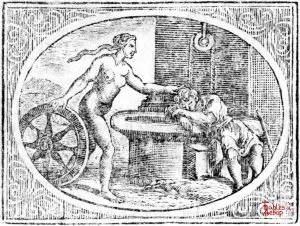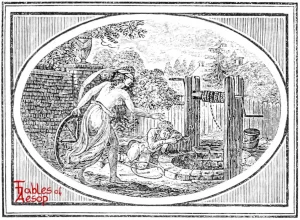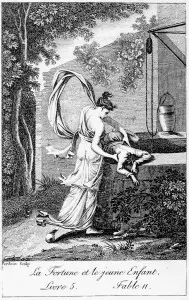A person slept by a well. Fortune, not wanting to be blamed for a drowning, saved the person from folly.
Everyone is more or less master of his own fate.
[Townsend uses a traveler for this fable. Other translations seem to favor a boy in place of the traveler. Also, see the similar fable The Ploughman and Fortune.]

Townsend version
A traveler wearied from a long journey lay down, overcome with fatigue, on the very brink of a deep well. Just as he was about to fall into the water, Dame Fortune, it is said, appeared to him and waking him from his slumber thus addressed him: “Good Sir, pray wake up: for if you fall into the well, the blame will be thrown on me, and I shall get an ill name among mortals; for I find that men are sure to impute their calamities to me, however much by their own folly they have really brought them on themselves.”
Moral
Everyone is more or less master of his own fate.

Samuel Croxall (Fortune and the Boy)
A BOY was sleeping by the side of a well. Fortune saw him, and came and waked him: saying, Prithee, good Child, do not lie sleeping here; for if you should fall in, nobody would impute it to you, but lay all the blame upon me, Fortune.
THE APPLICATION
Poor Fortune has a great deal thrown upon her indeed; and oftentimes very unjustly too. Those of our actions which are attended with success, though often owing to some accident or other, we ascribe, without any scruple, to some particular merit or good quality in ourselves; but when any of our doings miscarry, though probably through our own insufficiency or neglect, all the ill consequences is imputed to Fortune, and we acquit ourselves of having contributed any thing towards it. The silliest part of each sex, when they dispose of themselves indiscreetly or disadvantageously in marriage, and have nothing else to say in excuse, cry out, O there is a fate in every thing, and there is no resisting fate, &c. But these people should take notice, that, as they have a very good proverb on their side, in relation to fortune already, it is highly unreasonable in them to claim more than their share, and to ascribe the ill success of their own foolish negociations to the management of fortune. Probably, the first occasion of confining the smiles of fortune to people of this stamp more particularly, might arise from the improbability of their succeeding by any art or right application of their own. And, therefore, by an opposite rule, the wise and industrious only should be entitled to ill luck, and have it in their power to charge fortune with every loss and cross which befals them: for if, when they have concerted their measures judiciously, and been vigilant and active in their business, matters refuse still to answer expection, they must be allowed to have very hard fortune: but fools have not the least right to take hold of this handle.

Thomas Bewick (Fortune and The Boy)
A School Boy, fatigued with play, laid himself down by the brink of a deep well, where he fell fast asleep. Fortune, whose wheel is always in motion, passing by, kindly gave him a tap on the head, and awoke him. My good boy, said she, arise and depart from this dangerous situation immediately; for if you had tumbled into this well, and been drowned, your friends would not have attributed the accident to your carelessness, but would have laid the whole blame upon me.
APPLICATION.
Mankind suffer more evils from their own imprudence, than from events which it is not in their power to control; but they are ever ready to complain of the perverseness of chance, and the capriciousness of fortune, and to impute the blame to her for whatever mischiefs may befal them, when these clearly arise from their own misconduct. Few men pass through life without having had reason at one time or another to thank Fortune for her favours; and great is the number of those who have, through their own folly, indolence, or inattention, neglected to profit by her kindness. Prudent people take every care not to put themselves in the power of accidents; but those who carelessly give up all their concerns to the guidance of blind chance, must not be surprised if by some of the revolutions of Fortune’s wheel, they feel the punishment due to their negligence and folly.
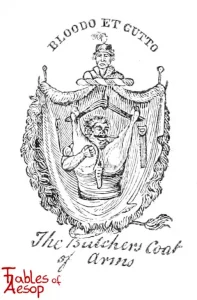

JBR Collection (Fortune and The Boy)
A little Boy quite tired out with play, stretched out, and fell sound asleep close to the edge of a deep well. Fortune came by, and gently waking him said, “My dear Boy, believe me, I have saved your life. If you had fallen in, everybody would have laid the blame on me; but tell me truly, now, would the fault have been yours or mine?”

Crane Poetry Visual (Fortune and The Boy)
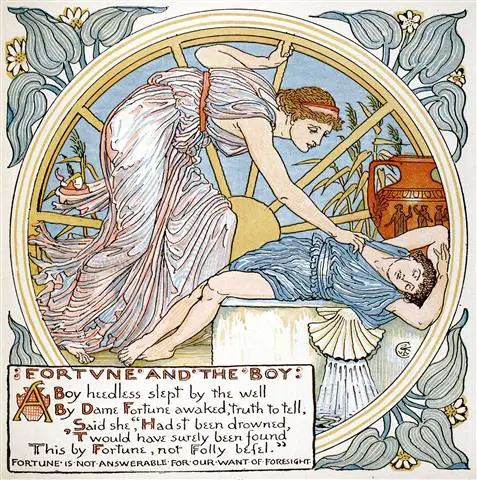
A Boy heedless slept by the well
By Dame Fortune awaked, truth to tell.
Said she, “Hadst been drowned,
‘T would have surely been found
This by Fortune, not Folly befel.”
Fortune is not answerable for our want of foresight.

de La Fontaine (La Fortune et le jeune Enfant)
Sur le bord d’un puits très profond
Dormoit, étendu de son long,
Un enfant alors dans ses classes:
Tout est aux écoliers couchette et matelas.
Un honnête homme, en pareil cas,
Auroit fait un saut de vingt brasses.
Près de là, tout heureusement,
La Fortune passa, l’éveilla doucement,
Lui disant: Mon mignon, je vous sauve la vie;
Soyez une autre fois plus sage, je vous prie.
Si vous fussiez tombé, l’on s’en fût pris à moi;
Cependant c’étoit votre faute.
Je vous demande, en bonne foi,
Si cette imprudence si haute
Provient de mon caprice. Elle part à ces mots.
Pour moi, j’approuve son propos.
Il n’arrive rien dans le monde
Qu’il ne faille qu’elle en réponde:
Nous la faisons de tous écots;
Elle est prise à garant de toutes aventures.
Est-on sot, étourdi, prend-on mal ses mesures;
On pense en être quitte en accusant son sort:
Bref, la Fortune a toujours tort.

Fortuna et Puer
Dormienti puero super os putei fertur astitisse Fortunam eumque excitasse dicendo, “Exsurge, O iuvenis, et abi hinc ocius. Novi enim genium hominum et tuum, quod si in puteum labereris, non te aut tuam secordiam, sed Fortunam incusabitis.”
Perry #174
